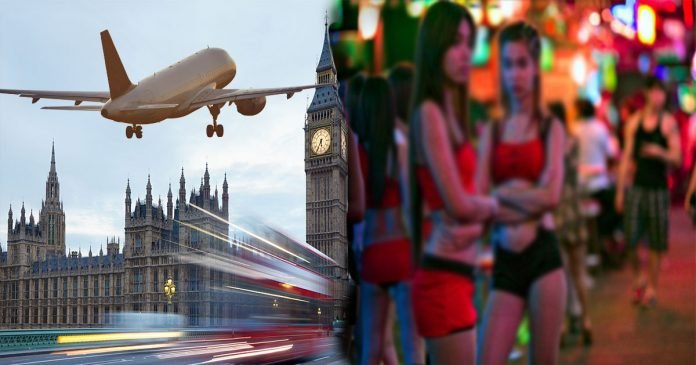Parliamentary trips ‘used for sex tourism and heavy drinking’
An investigation by Politico has shown that MPs within All-Party Parliamentary Groups (APPG) have racked up £450,000 in foreign trips, while some MPs are accused of taking advantage of the trips and using the opportunity for sex tourism.
APPGs are parliamentary groups devoted to a specific issue, but over 130 are dedicated to interest in a particular foreign country.
These country-specific APPGs often arrange lavish visits to host nations for their members, sometimes with funding from those countries or associated organisations.
This investigation centred around a small cluster of British MPs who are making foreign visits collectively worth tens of thousands of pounds every year, paid for by private companies or overseas governments with dubious human rights records.
The visits largely arise out of the MPs’ memberships of “country APPGs” — obscure, cross-party groups set up by backbench MPs to forge closer links with foreign nations.
MPs involved insist that the All-Party Parliamentary Groups can play valuable roles in building links abroad and that their overseas trips complement their duties as parliamentarians.
However, there are huge discrepancies in the amount of time different MPs choose to dedicate to this type of overseas travel, with trips frequently taken while parliament is sitting as well as during recess periods.
All-Party Parliamentary Groups are also used for lobbying by commercial and other interests. Earlier this year the chair of the standards committee asked for the power to shut down APPGs where there was a clear conflict of interest.
That call came after an investigation by the OpenDemocracy website found that the 775 groups received a total of £13 million from private companies since 2018.
Companies backing such groups include private healthcare firms, arms companies, and tech giants – all keen to have influence in Westminster.
Out for a jolly
Analysis found there are currently around 10 “super members” who have signed up for roles with 20 or more different “country APPGs.” Some have accepted dozens of free trips overseas during their time in parliament, paid for by foreign governments or businesses.
According to official records, this small group of backbench politicians have made overseas visits worth more than £453,000 since entering parliament. The true figure is likely higher, since MPs were only obliged to start declaring the value of gifts and hospitality in 2009.
The data includes:
Seven trips by Conservative MP Martin Vickers on which he was accompanied by his wife, or by an unnamed member of staff.
Three trips by Labour’s John Spellar of six days or more, including a week-long visit to Singapore.
£70,800 worth of trips by Tory MP Mark Menzies since he entered parliament in 2010, including six different trips in the calendar year 2016 alone.
One trip to Hong Kong by the SNP’s Angus Brendan MacNeil worth £10,359 — the most expensive single trip.
20 trips in 17 years by Tory Daniel Kawczynski, including visits to Morocco, Albania and Mauritania paid for by mining and chemical manufacturing companies.
Kawczynski has been investigated under Paragraph 17 of the Code of Conduct for Actions causing significant damage to the reputation of the House as a whole, or of its Members generally.
Kawczynski was reported to the parliamentary commissioner for standards, after the Guardian revealed how the politician hosted a Saudi Arabian businessman in parliament while hoping to secure a lucrative second job.
Amazingly Polish speaking, Polish-born Tory MP Daniel Kawczynski, has also claimed £22,000 under an obscure parliamentary scheme for language lessons in recent years, including £8,244.03 last year, the highest yet. The fact he claimed to speak fluent Polish must have slipped his mind… In a tweet in 2019 Kawczynski claimed that he was an “almost fluent Polish speaker” saying:
“As almost fluent Polish speaker I am doing all I can to convince Polish govenemt to veto extension of Article 50. Others working on Czechs and Hungarians. One of these will veto I predict.”
Other cross-party frequent flyers include…
Thirteen trips over the last seven years by the SNP’s Lisa Cameron, including two trips to New York in the space of three weeks.
Three trips to Sri Lanka and three to the Maldives by the DUP’s Ian Paisley Jr.
£84,680 worth of trips by Tory MP Mark Pritchard since he entered parliament in 2005. He made six foreign trips in 2015 and seven in 2016, and has visited Qatar three times in the last three years.
Sixteen trips to Gibraltar by Tory Andrew Rosindell since he became an MP in 2001, sometimes more than once a year, as well as to a total of 29 other countries.
Ten trips by Conservative MP Sheryll Murray accompanied by an unnamed member of staff.
There is a wider pattern of these MPs travelling frequently to countries known as tax havens, petrochemical producers or luxury destinations — including the Channel Islands, Gulf States, San Marino, and the Norfolk Islands in the Pacific.
MPs’ contributions about these countries in parliament have been varied: some praised the places they had visited; some did not mention them at all; while others accepted the hospitality of foreign governments they had previously criticized.
Almost all the visits declared were worth £1,000 or more.
The trips were all publicly declared in accordance with parliamentary rules about gifts and hospitality, but campaigners have raised questions over MPs’ overseas activities.
Rose Whiffen, a spokesperson for Transparency International, said that while APPGs could help inform debate, they are “a well-known route for private companies and foreign governments to gain direct access to MPs and peers.”
She added: “These findings highlight why there should be tighter limits on MPs and peers accepting foreign travel. There is a clear risk that overseas trips funded by foreign governments could give rise to the perception — or reality — that the judgement of parliamentarians is influenced by the generosity of their hosts.”
John O’Connell, chief executive of the TaxPayers’ Alliance, added: “Constituents will be asking whether all of these trips are really necessary.
“While these trips have not been on the taxpayers’ dime, they have been on the taxpayers’ time. MPs must ensure that travels abroad do not disrupt responsibilities at home.”
A number of British lawmakers have been using parliamentary trips abroad as an opportunity for the covert use of sex workers and for raucous, excessive drinking, according to MPs, peers, diplomatic and parliamentary officials who spoke to Politico during their investigation.
One former Conservative MP, now a member of the House of Lords, asked hosts for directions to the nearest brothel when he travelled to Southeast Asia on a visit with an all-party parliamentary group (APPG), according to another parliamentarian who was present.
Another Tory MP and former minister used to stay on after the MPs’ delegation had returned home in order to pursue his “interest in [local] women,” two former colleagues said.
“He showed an interest in pretty young girls,” said one. “He routinely stayed on after these visits and linked up with young women in the place in question.”
A senior Labour MP displayed a fondness for “Russian girls” during trips overseas, according to a foreign diplomat, who said local officials felt powerless to intervene because they worried about preserving their influence in Westminster.
Particular concerns have been raised over the activities of “country APPGs” — backbench cross-party groups made up of MPs and peers with a focus on a single country or a group of countries. The groups are subject to less stringent rules than the House of Commons’ better-known select committees, but are still able to use parliamentary premises for their meetings.
These groups’ focus on foreign countries mean they tend to make regular trips abroad, funded by overseas governments or private companies and often on parliamentary time.
As part of the ongoing investigation, Politico spoke to more than a dozen government officials and lawmakers in the U.K. and overseas who verified claims of drunken, lewd or sexual misbehaviour by certain MPs and peers on such trips.
Numerous MPs claimed that while some colleagues were quietly pursuing a genuine and valid interest in relations with these countries, others treated the trips as “a jolly” for essentially recreational purposes.
MPs’ relations with British Overseas Territories were raised repeatedly, with local officials saying some MPs had taken part in parties organized by diplomatic representatives at which young men and women were “supplied” for the purpose of engaging in sexual activities.
Certain MPs were often proactive in asking foreign governments for a full, expenses-paid trip overseas, the same local officials said, sometimes going as far as floating their preferences for champagne and large meals.
Overseas representatives have grown wary of such approaches, one said, and some have resorted to packing MPs’ agendas with as many visits and meetings as possible in order to reduce “free time” for potential misbehaviour. “There’s been a process of disappointment,” they added.
A former British parliamentarian said the government of one such territory held “deep frustrations” over the behaviour of visiting U.K. MPs “who see themselves as celebrities in their own lunchtime — they drink and behave badly and arrogantly. They’re patronizing to fellow politicians, never mind the people around them, the people from [the host country] and unfortunately waiting staff. It’s boorish behaviour.”
APPGs are allowed to use U.K. parliamentary premises for meetings and a special portcullis logo, but are not official parliamentary bodies and are largely unregulated.
Unlike select committees, there is no formal system for deciding their membership and they usually do not have dedicated staff unless provided by an external body such as a private company or a charity.
MPs do not receive any salary for attending APPGs, and trips undertaken by MPs as part of their APPG activities must be declared in the register of interests. However, the trips are not subject to any formal reporting process.
The former Labour MP Christian Matheson was forced to stand down last month after a complaint of sexual misconduct was upheld against him. A former member of his staff claimed he had invited her on a secret trip to Gibraltar, which the independent panel on MPs’ conduct found had been sexually motivated. Matheson denied the claims against him, and there is no suggestion he engaged in any inappropriate behavior separate from the upheld complaint.
Gibraltar has been the focus of previous misconduct allegations, after two opposition MPs were accused of becoming heavily intoxicated on a visit arranged by the Parliamentary Armed Forces Scheme. They dismissed the claims as “Tory smears.”
Support Independent Journalism Today
Our unwavering dedication is to provide you with unbiased news, diverse perspectives, and insightful opinions. We're on a mission to ensure that those in positions of power are held accountable for their actions, but we can't do it alone. Labour Heartlands is primarily funded by me, Paul Knaggs, and by the generous contributions of readers like you. Your donations keep us going and help us uphold the principles of independent journalism. Join us in our quest for truth, transparency, and accountability – donate today and be a part of our mission!
Like everyone else, we're facing challenges, and we need your help to stay online and continue providing crucial journalism. Every contribution, no matter how small, goes a long way in helping us thrive. By becoming one of our donors, you become a vital part of our mission to uncover the truth and uphold the values of democracy.
While we maintain our independence from political affiliations, we stand united against corruption, injustice, and the erosion of free speech, truth, and democracy. We believe in the power of accurate information in a democracy, and we consider facts non-negotiable.
Your support, no matter the amount, can make a significant impact. Together, we can make a difference and continue our journey toward a more informed and just society.
Thank you for supporting Labour Heartlands












